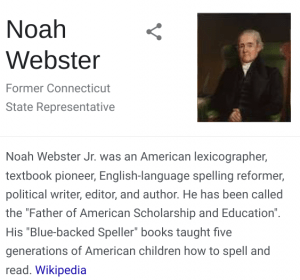After the American Revolution, some wanted to radically transform society and break away from all things English. As I said in class, some even wanted to make Hebrew the official language of the United States.
Instead of such a dramatic break, Noah Webster instead wrote an American English dictionary. Webster had no plan of abandoning English altogether, but he was eager to set up American as a distinct and independent dialect.
We get our spelling rules which differ from England’s spelling rules from Webster.
As you can see, he simplified spelling.
| aeon | eon |
| aesthetic | esthetic |
| anaemia | anemia |
| anaesthesia | anesthesia |
| gynaecologist | gynecologist |
| paediatrician | pediatrician |
Americans also dropped doubled consonants
| British | American |
|---|---|
| appal | appall |
| carburettor | carburetor |
| counsellor | counselor |
| dishevelled | disheveled |
| distil | distill |
| enrol | enroll |
| fulfil | fufill |
| instalment | installment |
| instil | instill |
| skilful | skillful |
| woollen | woollen |
Americans chanced -ence to –ense
| British | American |
|---|---|
| defence | defense |
| licence(noun) | license |
| offence | offense |
| pretence | pretense |
He dropped the silent e from words.
| British | American |
|---|---|
| annexe | annex |
| glycerine | glycerin |
| gramme | gram |
| grille(noun) | grill |
| programme | program |
| tonne | ton |
One of the more famous spelling differences between British and American English is -or vs -our
| British | American |
|---|---|
| arbour | arbor |
| ardour | arbor |
| armour | armor |
| behaviour | behavior |
| British | American |
| candour | candor |
| clamour | clamor |
| colour | color |
| demeanour | demeanor |
| endeavour | endeavor |
| favour | favor |
| flavour | flavor |
| harbour | habor |
| honour | honor |
| humour | humor |
| labour | labor |
| neighbour | neighbor |
| odour | odor |
| parlour | parlor |
| rancour | rancor |
| rigour | rigor |
| rumour | rumor |
| saviour | savior |
| savour | savor |
| splendour | splendor |
| tumour | tumor |
| valour | valor |
| vigour | vigor |
Re was replaced with –er to better reflect American pronunciation.
| British | American |
|---|---|
| calibre | caliber |
| centre | center |
| fibre | fiber |
| litre | liter |
| lustre | luster |
| meagre | meager |
| metre | meter |
| sabre | saber |
| sceptre | scepter |
| sepulchre | sepulcher |
| sombre | somber |
| theatre | theater |
Here are still some more.
| British | American |
|---|---|
| artefact | artifact |
| tyre | tire |
| cheque(banking) | check |
| chequerboard | checkerboard |
| chequered | checkered |
| cosy | cozy |
| doughnut | donut |
| draught | draft |
| gaol | jail |
| grey | gray |
| jewellery | jewelry |
| kerb(noun) | curb |
| plough | plow |
| sceptical | skeptical |
| sulphur | sulfur |
Finally, in regards to spelling rules. Ben Franklin proposed radically simplifying spelling. For instance, he suggested spelling “wife” as “yf”.
Spelling rules are actually a somewhat modern invention in English. 

